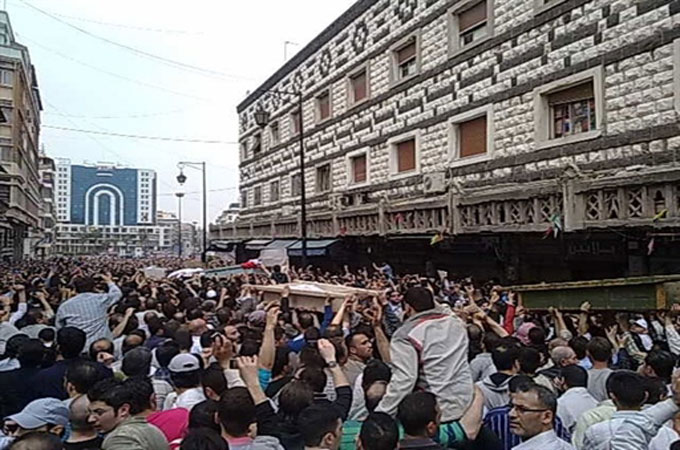US denies seeking Assad’s ouster
State department says it isn’t undermining Syria’s regime, after WikiLeaks exposed financing of opposition groups.

 |
| Protesters are calling for the ouster of president Bashar al-Assad, who inherited power from his father [AFP] |
As anti-government protests in Syria showed no sign of abating, the US state department on Monday denied that it was seeking the regime’s ouster.
“No, we are not working to undermine that government”, said US state department spokesman Mark Toner in response to a front-page report in Monday’s Washington Post newspaper about secret US financing of Syrian opposition groups, including a London-based satellite television channel that has called for overthrow of the Baathist regime headed by president Bashar al-Assad.
Assad “needs to address the legitimate aspirations of his people”, Toner insisted, noting that Assad himself had spoken over the weekend about implementing “the need to lift the state of emergency as well as implement broader reforms, and certainly, we are watching closely now to see how those words translate into deed”.
Indeed, in a bid to contain the rapidly spreading protests throughout Syria, Assad on Saturday swore in a new government headed by former agriculture minister Abdel Safar and pledged, among other measures, to repeal of the 48-year-old emergency law, “within a week at most”.
In striking contrast to his previous public remarks, he also offered condolences and prayers for the “martyrs” – estimated by independent human rights groups at more than 200 – who were killed in anti-government demonstrations since the protests began last month.
Demonstrations despite concessions
But the appearance on Sunday of tens of thousands of demonstrators demanding the regime’s ouster on the streets in towns and cities throughout Syria, as well as renewed protests, particularly in Homs, where as many as two dozen people were killed in protests Sunday evening, suggested to a growing number of analysts here that Assad’s concessions may be both too little and too late.
“It looks much less likely today than last week that he’s going to be able to either tamp down or stomp out this uprising”, said Joshua Landis, a Syria expert at the University of Oklahoma, who noted that the explicit calls by the demonstrators for Assad’s ouster marked a new stage in the confrontation.
“While the opposition may not be able to take over the state, if it can keep mounting big demonstrations, there is going to be no foreign investment and no tourism, and the economy will founder. And there will be no future for the regime,” said Landis, whose blog is widely read among regional specialists in Washington.
Another Syria specialist, Bassam Haddad of George Mason University, also suggested Syria was quickly reaching a tipping point that would make it very difficult for Assad to regain the initiative.
“The regime can reverse the process, but it will not, and it seems we are now approaching a point of no return in terms of the size of the demonstrations and the incapacity of the regime to make real changes that would slow the (opposition’s) momentum”, Haddad said.
“I think this will be the most decisive week in determining where the uprising is headed”, he said, noting that the attempted takeover of the central square by thousands of demonstrators in Homs on Monday “showed that the level of confidence of the protesters is rising very quickly”.
US response
Washington has generally responded cautiously to the uprising. As in Egypt, it initially emphasised the importance of maintaining stability in the country, even as it also appealed for the government to offer democratic reforms and respond non-violently to the protests.
After a particularly bloody incident in Daraa nearly two weeks ago, president Barack Obama issued a written statement denouncing what he called “the abhorrent violence committed against peaceful protesters”, as well as “any use of violence by protesters”.
Opposition representatives who have met here with US officials and implored them to at least toughen its language against the regime have expressed disappointment with Obama’s caution.
Backed by neo-conservative hawks who have long sought regime change in Damascus, they have urged the administration to follow the same path it trod in isolating Libyan leader Muammar Gaddafi, beginning with a UN resolution referring Assad to the International Criminal Court and the appointing of a special rapporteur to investigate alleged abuses by his security forces.
Basing its story on recently released Wikileaks cables, the Washington Post reported on Tuesday that the US state department had provided about six million dollars to opposition groups since 2006, when US-Syrian relations were at their lowest ebb under former president George Bush.
Much of the money has reportedly been spent on Barada TV, a satellite network run by Syrian expatriates allegedly linked to the Movement for Justice and Development (MJD), described in one cable as a “moderate Islamist organisation that eschews any ideological agenda aside from ending the Asad regime through democratic reform”.
Despite Obama’s official policy of engaging Damascus, Barada TV began broadcasting in April 2009 and recently ramped up its operations and now broadcasts 24 hours a day, although various sources said it was virtually unknown within Syria.
In his remarks Tuesday, Toner insisted that US support for Barada and civil-society groups in Syria was “no different” from similar “democracy-promotion” programmes it supports in other countries around the world.
“What’s different in this situation is that the Syrian Government perceives this kind of assistance as a threat to its control over the Syrian people”, he said. He also denied that the US was providing direct support for the MJD.
Support could hurt opposition
Nonetheless, the disclosures are likely to fuel charges by the Assad regime that the protesters are “dupes” for “foreign agents” working to promote chaos in Syria.
The US administration and most independent experts here, however, strongly disagree and are increasingly worried that chaos may indeed result from the growing polarisation between the government and the opposition.
Indeed, the US administration’s reluctance to speak out more strongly against the regime apparently stems from its doubts about the opposition, doubts that are reportedly shared by its two closest regional allies, Saudi Arabia and Israel, both of whom – at least until now – seem to have preferred to keep “the enemy they know” rather than face the uncertainty of a Syria without Assad.
That assessment has actually “emboldened the regime”, according to Haddad. “They have known that the position of the US, as well as Israel and Saudi Arabia, is pro-status quo in Syria”, he said, although, as the opposition appears to have gained strength over the last several days, Washington’s position may be changing.
“I frankly do not think they have a clue [about what to do]”, Landis said of Washington’s current stance, given the mushrooming of the opposition and the hardening of its demands.
“If they are saying (Assad) should not use violence, that means they should let the demonstrators overthrow the government, because, at this point, he is going to have to use violence in order to put this down.”
Landis said he is growing more worried about the reaction of the Alawite minority – of which Assad is the leader and from which the top ranks of the military and security forces are recruited – to the unrest and the possibility that the conflict could take on a sectarian character.
That worry is shared by Haddad who noted “serious reports that the latest demonstrations, especially in Homs, have a Salafi Islamist component”. Salafis, who are Sunni Muslims, regard Alawites, who constitute about 12 per cent of the total population, as heretics.
“Syria is also home to Christian, Druze, and Shiite minorities – about 15 percent of the population – and they tend to support the Alawite regime”, according to Mohammed Bazzi, a regional expert at the Council on Foreign Relations.
“Along with many secular Sunnis, these minorities look to Assad as a source of stability, and they fear that his fall could precipitate a civil war.”
A version of this article first appeared on Inter Press Service news agency.